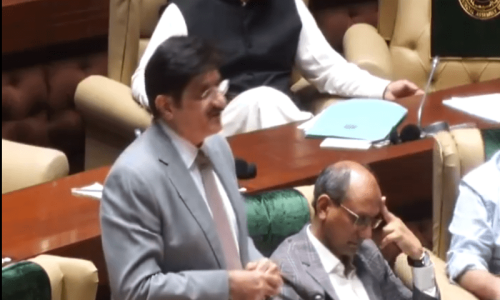HYDERABAD: Agriculture experts have expressed their concern over food crisis that could possibly hit the country in the wake of recent floods, observing that over 50 per cent population does not have adequate food.
They were speaking at a programme held on Monday at the Sindh Agriculture University (SAU), Tandojam, in collaboration with the Food and Agriculture Organisation (FAO) in connection with World Food Day.
A food exhibition organised by the Institute of Food Sciences and Technology at the programme was inaugurated by FAO’s provincial head Dr Rubina Wahaj SAU Vice Chancellor Dr Fateh Marri.
Dr Marri appealed to the international community, donors, G20 and OIC to help Pakistan and urged FAO to advocate its case.
FAO urged to advocate Pakistan’s case
While over 50 per cent of people in the country did not have access to adequate food, Thar was facing a shortage of food, he said, adding that mortality rate among women and children was increasing due to paucity of nutritious food.
The VC said that G20 and OIC should include food security in Pakistan on their agenda. The agricultural system in the country needs modernisation and diversification. He observed that agricultural production here could not be increased over the last 20 years. He noted that Pakistan’s agriculture sector focus on a few commodities.
Dr Marri said that lenders should write off Pakistan’s loans and industrial countries should compensate it against the losses caused by climate change.
FAO’s Sindh head Dr Rubina Wahaj said that climate change had left adverse effects on agriculture sector due to which food security risk had increased. She pointed that over 83 million people in the world were hit by food insecurity while people did not have adequate money to buy food.
“FAO is working with the SAU and other institutions in the country on international food system, focusing more on supporting and training small farmers and wants to create opportunities, including nutrition for rural children and women.
Dr Jan Muhammad Marri, SAU’s Umerkot sub-campus pro-VC, said that on the one hand, there were many concerns regarding health of women and children in Tharparkar due to a lack of food and, on the other, there were many organic vegetables and fruits which could be produced in the region. He said that SAU was starting work on arid farming in Thar.
Dr Aijaz Ali Khooharo, dean of faculty of social sciences, said that there were other causes of food insecurity, especially lack of suitable storage facilities and wastage/non-utilisation of food.
Dr Mohammad Ismail Kambhar said that Pakistan was self-sufficient in various agricultural commodities. It produces more than most other countries in the world but the recent floods have turned the situation serious. “Health and growth of children are not going well due to a lack of nutrition,” he observed.
Published in Dawn, October 18th, 2022














































Dear visitor, the comments section is undergoing an overhaul and will return soon.